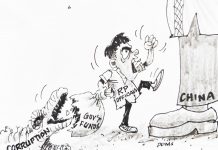Over the years, different low-level government officials have been summarily removed or suspended for comparatively petty offenses—such as improprieties in the disbursement of travel allowances or errors in government forms—while alleged plunderers, grafters, and other grandiose bureaucratic thieves are permitted to run wild. The Ombudsman and the Civil Service Commission have never hesitated to make an example out of these petty workers, flaunting their ouster as evidence of bureaucratic probity. But the same institutions dawdle, delay, or turn a blind eye when the accused are agents of influence and wealth. The law here, it appears, bites only the powerless.
This sour reality is not a one-time coincidence but a persistent disease of governance. In the Philippines, accountability is selective, and justice is conveniently blind in one eye. The small fish are such convenient targets—they have no lawyers in standby, strings to be pulled, funds to be expended on influence. They are the ideal prizes for those desperate agencies that want to be seen as having integrity. As the “big fish”—those who stole billions, fixed contracts, and looted funds—swim scot-free, waving from the ease of air-conditioned offices as if the moral law did not apply to them. The machinery of justice only functions where power does not extend.
The Civil Service Commission can be rigid in disciplining a late teacher. But it is deaf and dumb when charged with corrupt practices against a senator or cabinet member. The Ombudsman slithers at light speed if the respondent is a janitor, clerk, or ordinary employee—but crawls like molasses if the accused is a dignitary. The Sandiganbayan, literally “support of the people,” melts before the influential. How often have we witnessed cases dismissed, charges downgraded, or evidence “lost” if the accused dons a barong with power embroidery? This brazen double standard taunts the country’s conscience. It belittles all honest workers who believe in government service as a public obligation.
How can the state assume moral high ground when it condemns a messenger for a missing paperclip while rewarding a plunderer with reappointment or promotion? The hypocrisy is revolting. The junior employee who breaks a rule is destroyed publicly, yet the mighty who destroy institutions are shielded, even sanctified, by the machinery they wreck. There is ill-omened irony in how corruption in this nation is treated. Small-time cheating is treated as a scandal, while wholesale corruption is treated as a political scandal. A clerk caught falsifying a receipt is demonized as a thief; a governor who steals millions is glorified as a “strong leader.” The greater the crime, the thicker the veil of impunity.
This perversion of values has exhausted our institutions and sucked the blood of decency from the people. It teaches all Filipinos a vile lesson: honesty is suicidal when dishonesty is protected by power. That culture of impunity is entrenched. Those with power hold sway over the systems meant to rein them in. They stifle investigations, gag whistleblowers, and kill cases in process, in straightjackets. The accused wait for verdicts, dying of natural causes, and the plundered spoils are never seen again.
That is not justice delayed—it is justice buried on purpose. And with each episode, when a grand corruption is not punished, everybody gets the message: the law is not for all; it flexes according to the weight of one’s pocket and the reach of one’s position. This discriminatory application of justice inspires despair among ordinary Filipinos. It fosters cynicism, that tired shrug that says, “Nothing will change.” And cynicism is precisely what crooked leaders desire: a toxic citizenry too disillusioned to oppose. The danger is not the corruption, but the numbing that comes from it. When citizens stop expecting justice, they stop demanding it. And when nobody speaks out, impunity devours its way until even the faintest spark of decency in the behavior of public life is extinguished.
Perhaps it’s time to reclaim the illusions from justice and clothe them again in courage. Laws must bite both ways—against the poor and the rich. Institutions must be capable of shaking in fear at the people’s ire more than at the politicians’ pressure. Arresting only the little fishes and giving in to the mighty is not good enough; integrity must have integrity. Those in power must be brought to book for their wrongdoing to restore faith in the system. For as long as justice bends the knee to power, this nation shall remain hostage to corruption—and the honest Filipino, however devout, shall forever stand alone among the rubble of justice.




